Black lesbian newsletter, S-150 30:12, Special Collections
50 Features of Special Collections: Gay and Lesbian History and Culture Collection
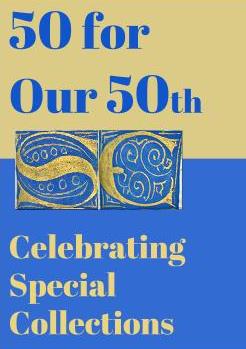
The Gay and Lesbian History and Culture Collection in Special Collections is comprised of over 3,000 rare books and serials (any publication issued in successive parts), as well as pamphlets. This collection originally came from a donation of gay and lesbian books, serials, and pamphlets in the mid-1990s.
The materials in this collection help document the birth of the gay rights movement and the development of the LGBT community in California and the rest of the U.S. Highlights from the collection include the first issue of the first lesbian serial published in the U.S. (Vice Versa, 1947), as well as openly gay and lesbian novels from the late 1920s and 1930s. It also has publications of earlier gay organizations from the 1960s, such as the Society for Individual Rights (1964-1976), the Association for Responsible Citizens (1965-1967), and the Janus Society (1964-1969). In addition to publications from gay communities, there are also publications from the 1970s from lesbian and feminist organizations, including The Amazon Quarterly, The Furies, Lesbian Tide, and Womanspirit.
One serial from the collection that caught our attention is the San Francisco publication Black Lesbian Newsletter (BLN), especially since the newsletter was published before novelist and poet Alice Walker defined black feminism as “womanism” in 1983. For submissions, the BLN welcomed “any and all written and graphic work by local black lesbians.” The format of the newsletter included “news, reviews, personal perspectives, political commentaries, interviews, poetry, letters, ads, announcements, humor, and journal entries.”
Throughout the newsletters, contributors to the BLN not only addressed issues of gender inequality but also of racism – notably how out of place black lesbians felt among white feminists in “The Need for a Black Lesbian Front”:
When the [feminist] movement first started, there seemed to be total denial that there were any Black women active in this struggle for equal rights, which perpetuated this “savior syndrome” on the parts of white women. The resistance to working equally and intelligently with Black women intensified when our white sisters found out that Black women didn’t need to be “saved.” There seemed to have been this stereotypic mentality that Black women needed saving…The reality is that the Feminist movement, as it stands now, is just another racist and oppressive mechanism of this racist society…We as Black lesbians need to take control of our lives by creating a strong political front that directly addresses our needs as Black lesbians…We must change the face of the Feminist movement. By using our knowledge and strength, the movement can be a strong force again.
Another contributor expressed frustration with the lack of workshops on racism in feminist studies at the National Women’s Studies Association Conference, “Few workshops addressed the issue of race or racism in feminist education, and few women of color participated in panels or events that did not have a racial/ethnic focus.” The author pointed out that women of color “discovered…that race was the only thing they were asked to talk about, even if they felt quite competent in other areas as well.”
Covers of the BLN:

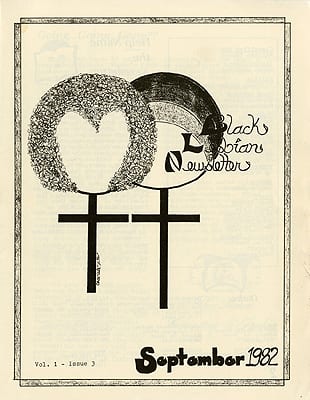
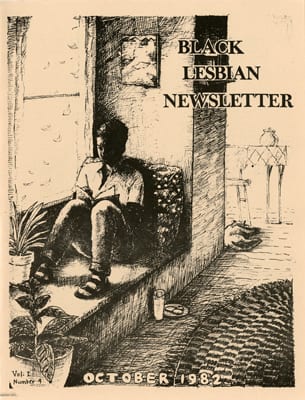
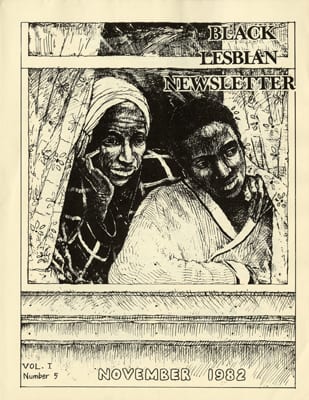
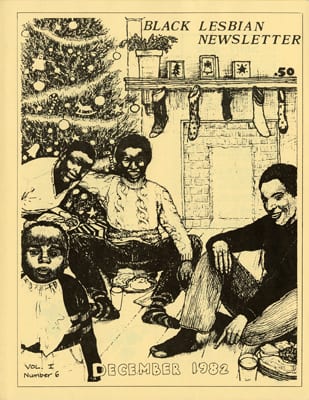
For more information about the BLN, visit Special Collections in Shields Library. You can also search for pamphlets and serials through the library catalog at:
Pamphlets:
Gay and Lesbian History and Culture Collection
Serials:
Gay and Lesbian History and Culture Collection
Works cited:
Gaines, Eileen. “The Need for a Black Lesbian Front.” Black Lesbian Newsletter (August 1982): 3.
Stewart, Helen. “Going…Going…Gone??” Black Lesbian Newsletter vol. 1, no. 3 (September 1982): 3-4.